- Home
- Tennessee Williams
Three Plays
Three Plays Read online
Three Plays
By Tennessee Williams
Contents
Cat on a Hot Tin Roof
The Glass Menagerie
A Streetcar Named Desire
Cat on a Hot Tin Roof
By Tennessee Williams, 1955
CONTENTS
ACT ONE
ACT TWO
ACT THREE (Original)
ACT THREE (Updated)
SHORT BIO
PERSON—TO—PERSON
EDITORIAL NOTE
STAGE CAST
MOVIE CAST
The set is the bed-sitting-room of a plantation home in the Mississippi Delta. It is along an upstairs gallery which probably runs around the entire house; it has two pairs of very wide doors opening onto the gallery, showing white balustrades against a fair summer sky that fades into dusk and night during the course of the play, which occupies precisely the time of its performance, excepting, of course, the fifteen minutes of intermission.
Perhaps the style of the room is not what you would expect in the home of the Delta's biggest cotton-planter. It is Victorian with a touch of the Far East. It hasn't changed much since it was occupied by the original owners of the place, Jack Straw and Peter Ochello, a pair of old bachelors who shared this room all their lives together. In other words, the room must evoke some ghosts; it is gently and poetically haunted by a relationship that must have involved a tenderness which was uncommon. This may be irrelevant or unnecessary, but I once saw a reproduction of a faded photograph of the veranda of Robert Louis Stevenson's home on that Samoan Island where he spent his last years, and there was a quality of tender light on weathered wood, such as porch furniture made of bamboo and wicker, exposed to tropical suns and tropical rains, which came to mind when I thought about the set for this play, bringing also to mind the grace and comfort of light, the reassurance it gives, on a late and fair afternoon in summer, the way that no matter what, even dread of death, is gently touched and soothed by it. For the set is the background for a play that deals with human extremities of emotion, and it needs that softness behind it.
The bathroom door, showing only pale-blue tile and silver towel racks, is in one side wall; the hall door in the opposite wall. Two articles of furniture need mention: a big double bed which staging should make a functional part of the set as often as suitable, the surface of which should be slightly raked to make figures on it seen more easily; and against the wall space between the two huge double doors upstage: a monumental monstrosity peculiar to our times, a huge console combination of radio-phonograph (Hi-Fi with three speakers) TV set and liquor cabinet, bearing and containing many glasses and bottles, all in one piece, which is a composition of muted silver tones, and the opalescent tones of reflecting glass, a chromatic link, this thing, between the sepia (tawny gold) tones of the interior and the cool (white and blue) tones of the gallery and sky. This piece of furniture (?!), this monument, is a very complete and compact little shrine to virtually all the comforts and illusions behind which we hide from such things as the characters in the play are faced with....
The set should be far less realistic than I have so far implied in this description of it. I think the walls below the ceiling should dissolve mysteriously into air; the set should be roofed by the sky; stars and moon suggested by traces of milky pallor, as if they were observed through a telescope lens out of focus.
Anything else I can think of? Oh, yes, fanlights (transoms shaped like an open glass fan) above all the doors in the set, with panes of blue and amber, and above all, the designer should take as many pains to give the actors room to move about freely (to show their restlessness, their passion for breaking out) as if it were a set for a ballet.
An evening in summer. The action is continuous, with two intermissions.
Main Characters:
MARGARET
BRICK
MAE
GOOPER
BIG MAMA
BIG DADDY
REVEREND TOOKER
DOCTOR BAUGH
ACT ONE
At the rise of the curtain someone is taking a shower in the bathroom, the door of which is half open. A pretty young woman, with anxious lines in her face, enters the bedroom and crosses to the bathroom door.
MARGARET[shouting above roar of water]: One of those no-neck monsters hit me with a hot buttered biscuit so I havet' change!
[Margaret's voice is both rapid and drawling. In her long speeches she has the vocal tricks of a priest delivering a liturgical chant, the lines are almost sung, always continuing a little beyond her breath so she has to gasp for another. Sometimes she intersperses the lines with a little wordless singing, such as "Da-da-daaaa" | Water turns off and Brick calls out to her, but is still unseen. A tone of politely feigned interest, masking indifference, or worse, is characteristic of his speech with Margaret.]
BRICK: Wha'd you say, Maggie? Water was on s' loud I couldn't hear ya....
MARGARET: Well, I!—just remarked that!—one of th' no-neck monsters messed up m' lovely lace dress so I got t' cha-a-ange....
[She opens and kicks shut drawers of the dresser.]
BRICK: Why d'ya call Gooper's kiddies no-neck monsters?
MARGARET: Because they've got no necks! Isn't that a good enough reason?
BRICK: Don't they have any necks?
MARGARET: None visible. Their fat little heads are set on their fat little bodies without a bit of connexion.
BRICK: That's too bad.
MARGARET: Yes, it's too bad because you can't wring their necks if they've got no necks to wring! Isn't that right, honey?
[She steps out of her dress, stands in a slip of ivory satin and lace.]
Yep, they're no-neck monsters, monsters.... All no-neck people are monsters....
[Children shriek downstairs.]
Hear them? Hear them screaming? I don't know where their voice-boxes are located since they don't have necks. I tell you I got so nervous at that table tonight I thought I would throw back my head and utter a scream you could hear across the Arkansas border an' parts of Louisiana an' Tennessee. I said to your charming sister-in-law, Mae, honey, couldn't you feed those precious little things at a separate table with an oilcloth cover? They make such a mess an' the lace cloth looks so pretty! She made enormous eyes at me and said, 'Ohhh, noooooo! On Big Daddy's birthday? Why, he would never forgive me!' Well, I want you to know, Big Daddy hadn't been at the table two minutes with those five no-neck monsters slobbering and drooling over their food before he threw down his fork an' shouted, 'Fo' God's sake, Gooper, why don't you put them pigs at a trough in th' kitchen?'—Well, I swear, I simply could have di-ieed!
Think of it, Brick, they've got five of them and number six is coming. They've brought the whole bunch down here like animals to display at a county fair. Why, they have those children doin' tricks all the time! 'Junior, show Big Daddy how you do this, show Big Daddy how you do that, say your little piece fo' Big Daddy, Sister. Show your dimples, Sugar. Brother, show Big Daddy how you stand on your head!'—It goes on all the time, along with constant little remarks and innuendoes about the fact that you and I have not produced any children, are totally childless and therefore totally useless!—Of course it's comical but it's also disgusting since it's so obvious what they're up to!
BRICK [without interest]: What are they up to, Maggie?
MARGARET: Why, you know what they're up to!
BRICK [appearing]: No, I don't know what they're up to.
[He stands there in the bathroom doorway drying his hair with a towel and hanging on to the towel rack because one ankle is broken, plastered and bound. He is still slim and firm as a boy.—His liquor hasn't started tearing him down outside. He has the additional charm of that cool air of detachment that peop
le have who have given up the struggle. But now and then, when disturbed, something flashes behind it, like lightning in a fair sky, which shows that at some deeper level he is far from peaceful. Perhaps in a stronger light he would show some signs of deliquescence, but the fading, still warm, light from the gallery treats him gently.]
MARGARET: I'll tell you what they're up to, boy of mine!—They're up to cutting you out of your father's estate, and—
[She freezes momentarily before her next remark. Her voice drops as if it were somehow a personally embarrassing admission.]
—Now we know that Big Daddy's dyin' of—cancer....
[There are voices on the lawn below | long-drawn calls across distance. Margaret raises her lovely bare arms and powders her armpits with a light sigh. | She adjusts the angle of a magnifying mirror to straighten an eyelash, then rises fretfully saying:]
There's so much light in the room it—
BRICK [softly but sharply]: Do we?
MARGARET: Do we what?
BRICK: Know Big Daddy's dyin' of cancer?
MARGARET: Got the report today.
BRICK: Oh...
MARGARET [letting down bamboo blinds which cast long, gold-fretted shadows over the room]: Yep, got th' report just now... it didn't surprise me, Baby....
[Her voice has range, and music; sometimes it drops low as a boy's and you have a sudden image of her playing boy's games as a child.]
I recognized the symptoms soon's we got here last spring and I'm willin' to bet you that Brother Man and his wife were pretty sure of it, too. That more than likely explains why their usual summer migration to the coolness of the Great Smokies was passed up this summer in favor of hustlin' down here ev'ry whipstitch with their whole screamin' tribe! And why so many allusions have been made to Rainbow Hill lately. You know what Rainbow Hill is? Place that's famous for treatin' alcoholics an' dope fiends in the movies!
BRICK: I'm not in the movies.
MARGARET: No, and you don't take dope. Otherwise you're a perfect candidate for Rainbow Hill, Baby, and that's where they aim to ship you—over my dead body! Yep, over my dead body they'll ship you there, but nothing would please them better. Then Brother Man could get a-hold of the purse strings and dole out remittances to us, maybe get power-of-attorney and sign checks for us and cut off our credit wherever, whenever he wanted! Son-of-a-bitch!—How'd you like that, Baby?—Well, you've been doin' just about ev'rything in your power to bring it about, you've just been doin' ev'rything you can think of to aid and abet them in this scheme of theirs! Quittin' work, devoting yourself to the occupation of drinkin'!—Breakin' your ankle last night on the high school athletic field—doin' what? Jumpin' hurdles? At two or three in the morning? Just fantastic! Got in the paper. Clarksdale Register carried a nice little item about it, human interest story about a well-known former athlete stagin' a one-man track meet on the Glorious Hill High School athletic field last night, but was slightly out of condition and didn't clear the first hurdle! Brother Man Gooper claims he exercised his influence t' keep it from goin' out over AP or UP or every goddam' P'.
But, Brick? You still have one big advantage!
[During the above swift flood of words, Brick has reclined with contrapuntal leisure on the snowy surface of the bed and has rolled over carefully on his side or belly.]
BRICK [wryly]: Did you say something, Maggie?
MARGARET: Big Daddy dotes on you, honey. And he can't stand Brother Man and Brother Man's wife, that monster of fertility, Mae; she's downright odious to him! Know how I know? By little expressions that flicker over his face when that woman is holding fo'th on one of her choice topics such as—how she refused twilight sleep!—when the twins were delivered! Because she feels motherhood's an experience that a woman ought to experience fully!—in order to fully appreciate the wonder and beauty of it! HAH!
[This loud 'HAH!' is accompanied by a violent action such as slamming a drawer shut.]
—and how she made Brother Man come in an' stand beside her in the delivery room so he would not miss out on the 'wonder and beauty' of it either!—producin' those no-neck monsters....
[A speech of this kind would be antipathetic from almost anybody but Margaret; she makes it oddly funny, because her eyes constantly twinkle and her voice shakes with laughter which is basically indulgent]
—Big Daddy shares my attitude toward those two! As for me, well—I give him a laugh now and then and he tolerates me. In fact!—I sometimes suspect that Big Daddy harbors a little unconscious 'lech' fo' me....
BRICK: What makes you think that Big Daddy has a lech for you, Maggie?
MARGARET: Way he always drops his eyes down my body when I'm talkin' to him, drops his eyes to my boobs an' licks his old chops! Ha ha!
BRICK: That kind of talk is disgusting.
MARGARET: Did anyone ever tell you that you're an ass-aching Puritan, Brick? I think it's mighty fine that that ole fellow, on the doorstep of death, still takes in my shape with what I think is deserved appreciation! And you wanta know something else? Big Daddy didn't know how many little Maes and Goopers had been produced! 'How many kids have you got?' he asked at the table, just like Brother Man and his wife were new acquaintances to him! Big Mama said he was jokin', but that ole boy wasn't jokin', Lord, no! And when they infawmed him that they had five already and were turning out number six!—The news seemed to come as a sort of unpleasant surprise...
[Children yell below.]
Scream, monsters!
[Turns to Brick with a sudden, gay, charming smile which fades as she notices that be is not looking at her but into fading gold space with a troubled expression. It is constant rejection that makes her humor 'bitchy'.]
Yes, you should of been at that supper-table, Baby.
[Whenever she calls him 'baby' the word is a soft caress...]
Y'know, Big Daddy, bless his ole sweet soul, he's the dearest ole thing in the world, but he does hunch over his food as if he preferred not to notice anything else. Well, Mae an' Gooper were side by side at the table, direckly across from Big Daddy, watchin' his face like hawks while they jawed an' jabbered about the cuteness an' brilliance of th' no-neck monsters!
[She giggles with a hand fluttering at her throat and her breast and her long throat arched. She comes downstage and recreates the scene with voice and gesture.]
And the no-neck monsters were ranged around the table, some in high chairs and some on th' Books of Knowledge, all in fancy little paper caps in honour of Big Daddy's birthday, and all through dinner, well, I want you to know that Brother Man an' his partner never once, for one moment, stopped exchanging pokes an' pinches an' kicks an' signs an' signals I—Why, they were like a couple of cardsharps fleecing a sucker.—Even Big Mama, bless her ole sweet soul, she isn't th' quickest an' brightest thing in the world, she finally noticed, at last, an' said to Gooper, 'Gooper, what are you an' Mae makin' all these signs at each other about?'—I swear t' goodness, I nearly choked on my chicken!
[Margaret, back at the dressing-table, still doesn't see Brick. | He is watching her with a look that is not quite definable—Amused? shocked? contemptuous?—part of those and part of something else.]
Y'know—your brother Gooper still cherishes the illusion he took a giant step up on the social ladder when he married Miss Mae Flynn of the Memphis Flynns.
[Margaret moves about the room as she talks, stops before the mirror, moves on.]
But I have a piece of Spanish news for Gooper. The Flynns never had a thing in this world but money and they lost that, they were nothing at all but fairly successful climbers. Of course, Mae Flynn came out in Memphis eight years before I made my debut in Nashville, but I had friends at Ward-Belmont who came from Memphis and they used to come to see me and I used to go to see them for Christmas and spring vacations, and so I know who rates an' who doesn't rate in Memphis society. Why, y'know ole Papa Flynn, he barely escaped doing time in the Federal pen for shady manipulations on th' stock market when his chain stores crashed, and as
for Mae having been a cotton carnival queen, as they remind us so often, lest we forget, well, that's one honour that I don't envy her for!—Sit on a brass throne on a tacky float an' ride down Main Street, smilin', bowin', and blowin' kisses to all the trash on the street—
[She picks out a pair of jewelled sandals and rushes to the dressing-table.]
Why, year before last, when Susan McPheeters was singled out fo' that honour, y'know what happened to her? Y'know what happened to poor little Susie McPheeters?
BRICK [absently]: No. What happened to little Susie McPheeters?
MARGARET: Somebody spit tobacco juice in her face.
BRICK [dreamily]: Somebody spit tobacco juice in her face?
MARGARET: That's right, some old drunk leaned out of a window in the Hotel Gayoso and yelled, 'Hey, Queen, hey, hey there, Queenie!' Poor Susie looked up and flashed him a radiant smile and he shot out a squirt of tobacco juice right in poor Susie's face.
BRICK: Well, what d'you know about that.
MARGARET [gaily]: What do I know about it? I was there, I saw it!
BRICK [absently]: Must have been kind of funny.
MARGARET: Susie didn't think so. Had hysterics. Screamed like a banshee. They had to stop th' parade an' remove her from her throne an' go on with—

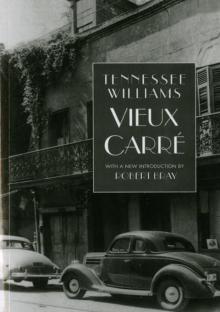 Vieux Carre
Vieux Carre The Night of the Iguana
The Night of the Iguana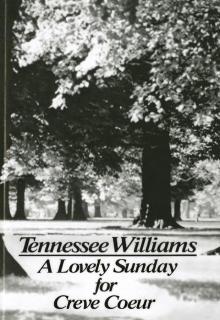 A Lovely Sunday for Creve Coeur
A Lovely Sunday for Creve Coeur Sweet Bird of Youth
Sweet Bird of Youth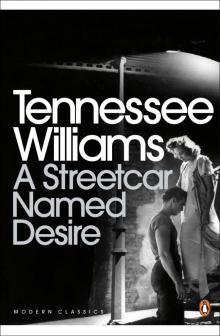 Streetcar Named Desire
Streetcar Named Desire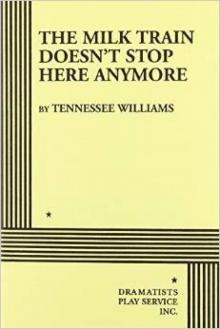 The Milk Train Doesn't Stop Here Anymore
The Milk Train Doesn't Stop Here Anymore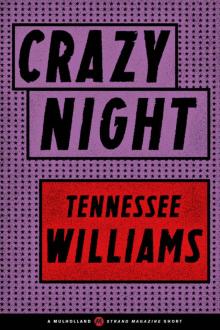 Crazy Night
Crazy Night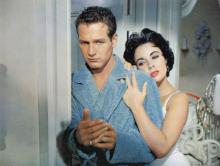 Three Plays of Tennessee Williams
Three Plays of Tennessee Williams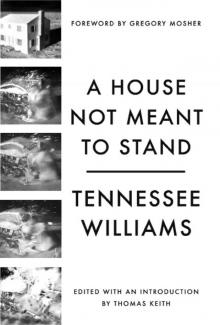 A House Not Meant to Stand
A House Not Meant to Stand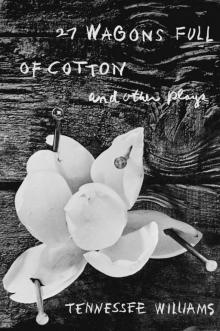 27 Wagons Full of Cotton and Other Plays
27 Wagons Full of Cotton and Other Plays Tales of Desire
Tales of Desire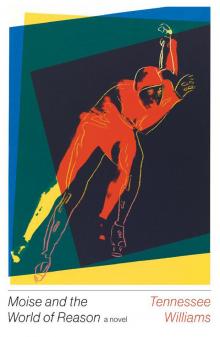 Moise and the World of Reason
Moise and the World of Reason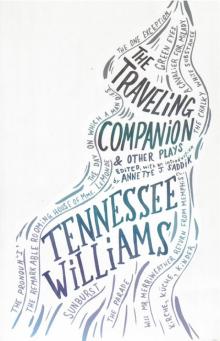 The Traveling Companion & Other Plays
The Traveling Companion & Other Plays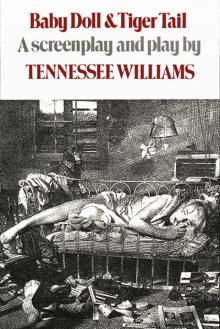 Baby Doll Tiger Tail: A Screenplay and Play by Tennessee Williams
Baby Doll Tiger Tail: A Screenplay and Play by Tennessee Williams Memoirs
Memoirs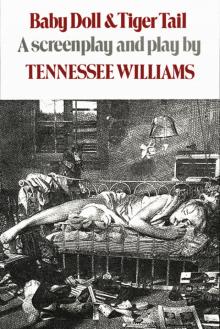 Baby Doll & Tiger Tail
Baby Doll & Tiger Tail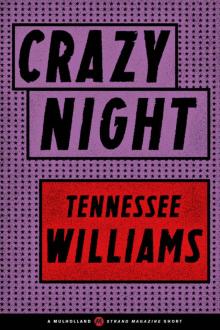 Crazy Night (A Mulholland / Strand Magazine Short)
Crazy Night (A Mulholland / Strand Magazine Short)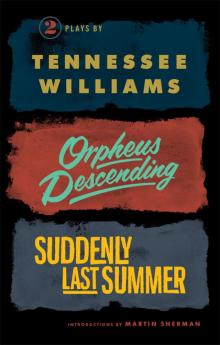 Orpheus Descending and Suddenly Last Summer
Orpheus Descending and Suddenly Last Summer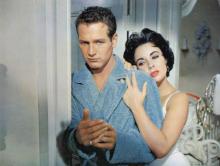 Three Plays
Three Plays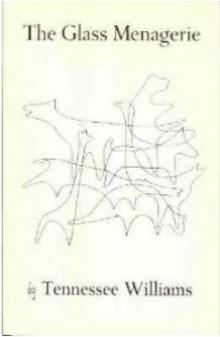 The Glass Menagerie
The Glass Menagerie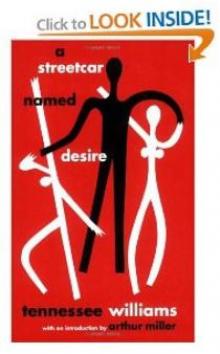 A Streetcar Named Desire
A Streetcar Named Desire